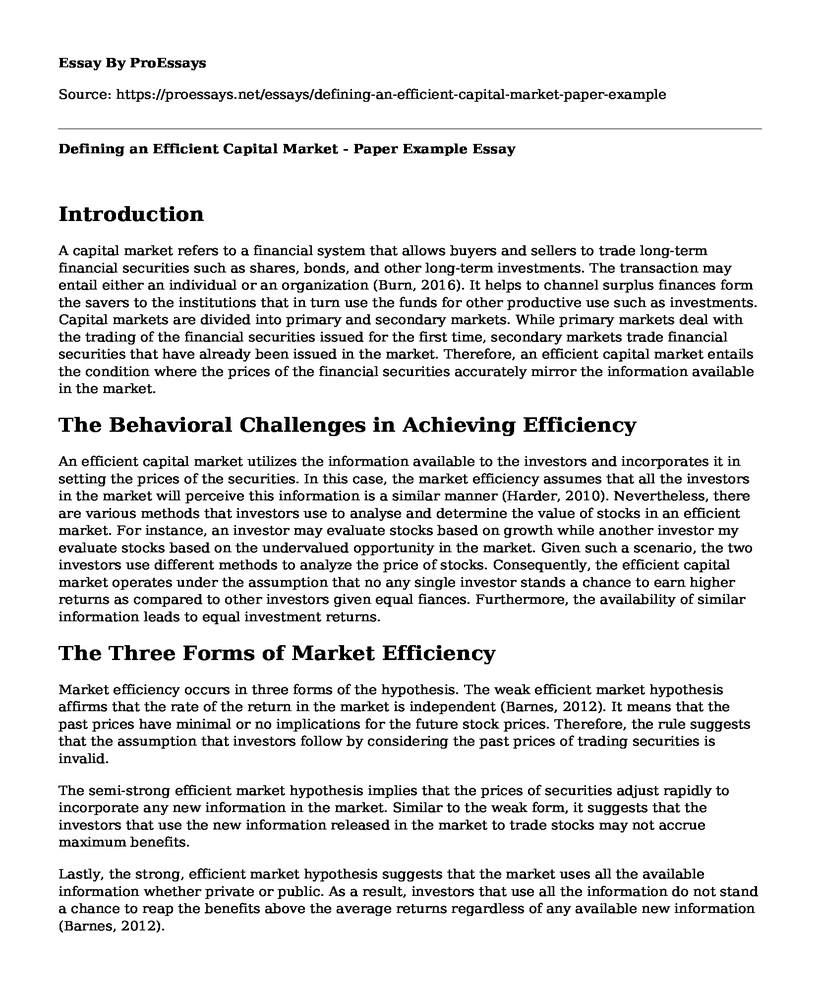Introduction
A capital market refers to a financial system that allows buyers and sellers to trade long-term financial securities such as shares, bonds, and other long-term investments. The transaction may entail either an individual or an organization (Burn, 2016). It helps to channel surplus finances form the savers to the institutions that in turn use the funds for other productive use such as investments. Capital markets are divided into primary and secondary markets. While primary markets deal with the trading of the financial securities issued for the first time, secondary markets trade financial securities that have already been issued in the market. Therefore, an efficient capital market entails the condition where the prices of the financial securities accurately mirror the information available in the market.
The Behavioral Challenges in Achieving Efficiency
An efficient capital market utilizes the information available to the investors and incorporates it in setting the prices of the securities. In this case, the market efficiency assumes that all the investors in the market will perceive this information is a similar manner (Harder, 2010). Nevertheless, there are various methods that investors use to analyse and determine the value of stocks in an efficient market. For instance, an investor may evaluate stocks based on growth while another investor my evaluate stocks based on the undervalued opportunity in the market. Given such a scenario, the two investors use different methods to analyze the price of stocks. Consequently, the efficient capital market operates under the assumption that no any single investor stands a chance to earn higher returns as compared to other investors given equal fiances. Furthermore, the availability of similar information leads to equal investment returns.
The Three Forms of Market Efficiency
Market efficiency occurs in three forms of the hypothesis. The weak efficient market hypothesis affirms that the rate of the return in the market is independent (Barnes, 2012). It means that the past prices have minimal or no implications for the future stock prices. Therefore, the rule suggests that the assumption that investors follow by considering the past prices of trading securities is invalid.
The semi-strong efficient market hypothesis implies that the prices of securities adjust rapidly to incorporate any new information in the market. Similar to the weak form, it suggests that the investors that use the new information released in the market to trade stocks may not accrue maximum benefits.
Lastly, the strong, efficient market hypothesis suggests that the market uses all the available information whether private or public. As a result, investors that use all the information do not stand a chance to reap the benefits above the average returns regardless of any available new information (Barnes, 2012).
The Implications for Corporate Finance
Market efficiency has a significant effect on corporate finance. For instance, the management cannot use creative accounting to lire investors to purchase their stocks. Also, organizations cannot profitably forecast on the future earnings of foreign currencies and other financial instruments. It also becomes difficult to speculate issues regarding debt and equity in the organization. As a consequence, the management can reap maximum profits by carefully following the market prices therein (Harder, 2010).
The Real Estate Market as an Efficient Capital Market
A real estate market does not reflect an efficient capital market as compared to other classes of assets such as stocks. It is because, for instance, the price of the stock in a particular company is the same in different geographical locations (Burn, 2016). However, the price of real estate's varies depending on the area. Although there are real estate trends that track and provide new information to the various players in the market, the prices do not adjust immediately to incorporate this information. It thus shows they are not efficient.
References
Barnes, P. (2012). Stock Market Efficiency, Insider Dealing and Market Abuse. Gower Publishing, Ltd.,.Burn, L. (2016). Capital Markets Union and regulation of the EU's capital markets. Capital Markets Law Journal, 11(3), 352-386. doi: 10.1093/cmlj/kmw011
Harder, S. (2010). The Efficient Market Hypothesis and Its Application to Stock Markets. GRIN Verlag,.
Cite this page
Defining an Efficient Capital Market - Paper Example. (2022, Jul 27). Retrieved from https://proessays.net/essays/defining-an-efficient-capital-market-paper-example
If you are the original author of this essay and no longer wish to have it published on the ProEssays website, please click below to request its removal:
- Two Investment Projects Analysis
- Cyber Security Threats in Banking Essay
- BRICS Development Bank as an Alternative to IMF in Africa: Quantitative and Qualitative Hypotheses Testing
- The Advantages and Disadvantages of Medical Savings Account Model in Singapore
- Liability Risks Paper Example
- Paper Example on Positive Cash Flow and Working Capital Strategies Enhance Profitability of BAT Bangladesh
- Primary & Secondary Markets: Crucial Role in Stock Market - Essay Sample







